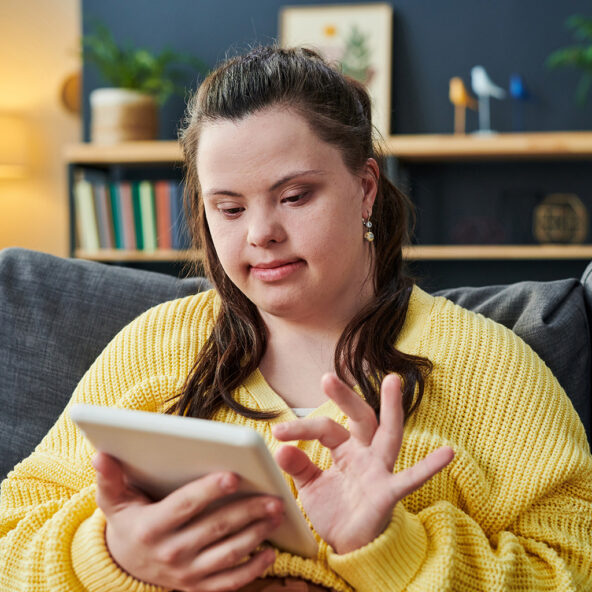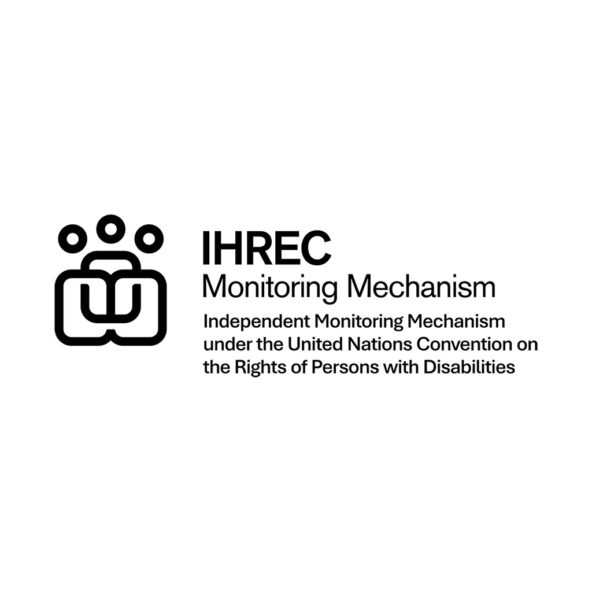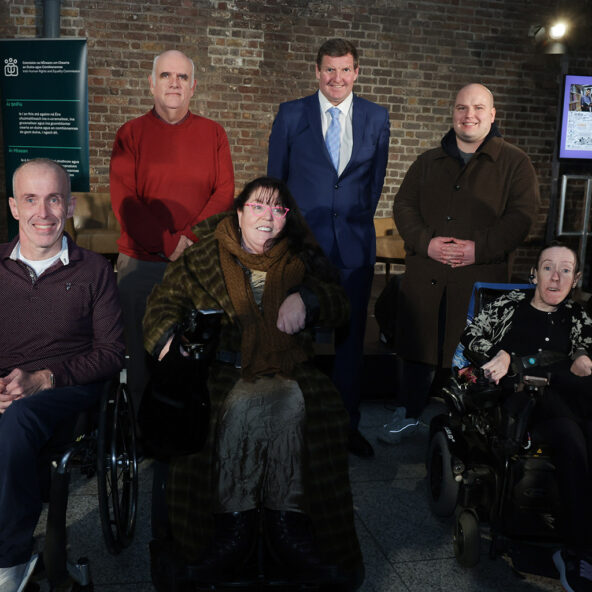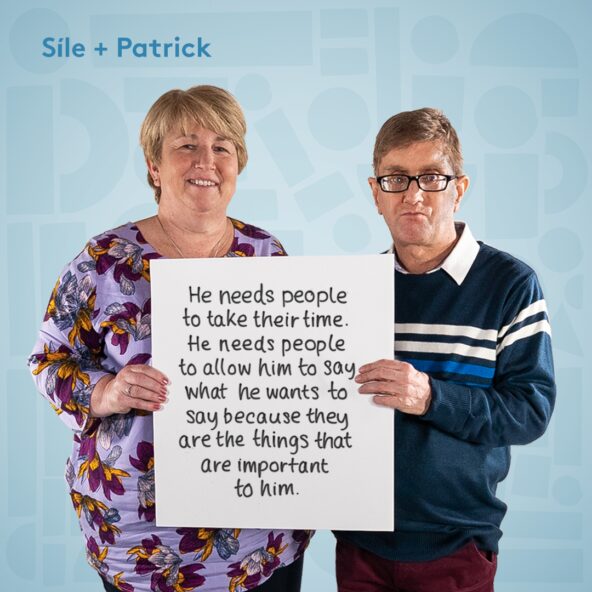What is Disability
‘Disability’ is defined broadly to include, physical, intellectual, learning, cognitive, emotional or medical conditions.
Case law has established that the definition includes, for instance, depression, epilepsy, claustrophobia and agoraphobia, alcoholism, facial scarring, Attention Deficit Hyperactivity Disorder, HIV infection, diabetes and dyslexia.
What has disability got to do with human rights?
Disability is a natural part of our human diversity, and one that must be respected and supported in all its forms.
The hundreds of thousands of disabled people in Ireland have the right to participate with dignity in everyday life—at home, school, work or in their community. These rights are protected in national and international laws.

Are there laws about disability?
A few of the key laws about disability in Ireland, the European Union, and internationally are:
- United Nations Convention on the Rights of Persons with Disabilities
- Disability Act 2005
- Assisted Decision-Making (Capacity) Act 2015
- Education (Admission to Schools) Act 2018
- Education of Persons with Special Education Needs Act 200
- Employment Equality Acts 1998 to 2015
- Equal Status Acts 2000 to 2015
- European Union (Accessibility of Websites and Mobile Applications of Public Sector Bodies) Regulations 2020
- European Union (Accessibility Requirements of Products and Services) Regulations 2023
What is IHREC doing on disability?
Our job is to promote, protect, and monitor how Ireland follows the UNCRPD.
In Ireland, IHREC is the official Independent Monitoring Mechanism for the United Nations Convention on the Rights of Persons with Disabilities (UNCRPD).
This means that IHREC is responsible for checking that the government are doing what they should be doing for disabled people.
A central pillar of the mechanism is that disabled people and their representative organisations participate in an active and meaningful way in the monitoring process.
We collaborate with disabled individuals and organisations. This ensures that people who have real experience with disability shape our work.

What does the Independent Monitoring Mechanism do?
We promote, protect, and monitor how Ireland follows the UNCRPD.
We do this by:
- Raising awareness
- Strengthening skills
- Reviewing laws
- Working with international and regional human rights groups and other national institutions
- Considering individual and group complaints when rights are not upheld
- Conducting inquiries
- Taking part in judicial proceedings (court cases)
- Issuing reports on the complaints received
- Developing and maintaining a system to check how laws and policies affect people
- Having benchmarks and indicators
- Maintaining information on how the Convention is being implemented
IHREC prepares Independent Reports of State to show how the State is working to meet international monitoring. These reports are expected to provide a strong and reliable starting point for external evaluations.
As the Independent Monitoring Mechanism, we will also contribute to developing the research and evidence needed to support effective monitoring and policy development – below are some examples of work we have done on specific articles of the UNCRPD.
Exploitation, violence and abuse against disabled people is illegal.
Article 16 of the UNCRPD states that governments must protect disabled people from exploitation, violence and abuse, whether it happens inside or outside the home.
The State must take steps to prevent abuse, including making sure that all services for disabled people are independently monitored. Disabled victims and survivors of exploitation, violence and abuse should have specialist services available to help them. The State should investigate abuse and prosecute abusers.
IHREC works on behalf of disabled people facing abuse. We want to improve standards of prevention, support and justice. We call for greater understanding and more effective response from the Government to all forms of abuse. Our specific concerns include:
- Widespread abuse of disabled people in residential institutions
- Inadequate investigations of abuse
- Weak penalties for abusers
- Domestic, sexual and gender-based violence (DSGBV) against disabled women, including abuse by partners, caregivers and family members, and in residential settings
Preventing abuse
IHREC recommends:
- Awareness-raising campaigns to highlight the types of violence and abuse that affect disabled people. Recent DSGBV awareness campaigns have failed to get their message across.
- Training professionals in health, education, housing and social care to look out for cases of exploitation, violence and abuse, and to take action.
Providing support services
We believe disabled victims and survivors need:
- High-quality specialist support services that meet their diverse needs
- Refuge spaces and safe homes that are built or adapted for all users, in line with universal design principles
- More investment in specialist therapeutic services for victims and survivors of abuse, as well as in general mental health services
- Services that cover short-term, medium-term and long-term needs, including:
- Counselling
- Psychosocial support (involving family or community members)
- Trauma care after physical or psychological injury
Criminal justice measures
IHREC calls on the Government to:
- Extend the criminal offence of coercive control to cover the controlling behaviour that disabled women may experience from carers, relatives and friends
- Make forced sterilisation a criminal offence in Ireland (this form of abuse affects disabled women more than other groups)
- Make Irish Sign Language interpretation services and intermediary support widely available in criminal or family law cases that concern abuse
Protecting disabled people in residential institutions
Many disabled people have to live in residential institutions due to lack of resources to help them live independently. In these centres, they may be at risk of abuse. We believe residents must be better protected against exploitation, violence and abuse in the following ways.
Case reviews
We have raised grave concerns about institutional abuses of disabled people. Although review mechanisms have been established to examine some major concerns of abuse, reviews are treated as internal learning events. They do not include recommendations for that abusers are legally held to account for their actions
Response to case reviews
We call for a stronger response to case reviews. For example, we believe the authorities should:
- Publish case reports (with information such as victims’ names removed where necessary)
- Make clear who is accountable for behaviour in a residential centre
- Improve communication between agencies
Investigating residential centres
The Health Information and Quality Authority (HIQA) investigates residential centres. However, these inspections focus on monitoring facilities and do not have the power to investigate individual cases and complaints. There are long-standing calls for the Government to introduce adult safeguarding legislation. This would ensure complaints of abuse and neglect can be investigated, both in residential centres and in the community. The legislation must be based on the UNRPCD, and it must be developed in consultation with the groups it would affect.
Disabled people have a right to equal access to employment.
Article 27 of the UN Convention on the Rights of Persons with Disabilities (UNCRPD) sets out this right. It means that the State must promote opportunities for disabled people to gain employment in both the public and private sectors. Disabled people are entitled to fair treatment at work, including decent pay, safe working conditions and protection from harassment.
The employment gap
The disability employment gap in Ireland is among the largest in the EU. This means the employment rate – the proportion of people with a job – is lower for people with a disability than for those without. It is lower in Ireland than elsewhere in Europe. Fewer disabled women work full time in Ireland than in any other EU country, and they may be paid less than men. The employment gap persists in Ireland even though EU directives on equality and human rights apply to all member states.
Why is the gap so large?
Access to education and employment in Ireland is much easier for able-bodied people than those with disabilities. Disabled people face barriers at every stage. For example:
- Transport: Public transport can be difficult to use and private transport can be too expensive. Disabled people need regular accessible bus and train services to help with job seeking and commuting.
- Rates of pay: Employers are legally allowed to offer disabled workers different rates of pay. Some disabled people have to work as unpaid carers instead of looking for employment. Others have difficulty in arranging childcare.
Support at work: Disabled workers may need their employers to make ‘reasonable accommodation’ (such as installing ramps or adapting working hours) but do not have an official right to be consulted about it.
Key IHREC recommendations
IHREC calls on the Government to put into practice the existing EU and Irish policies on human rights and equality. We have recommended that the State proactively addresses institutional discrimination and structural barriers that affect disabled people’s access to the labour market. In addition, IHREC calls on the Government to:
- Close the remaining gaps in the laws on equal pay and access to job opportunities for disabled people, including the gender pay gap
- Clarify the duty of employers to make reasonable accommodation for disabled employees and consult with them in advance
- Ensure existing schemes deliver human rights and equality for all (including providing integrated childcare and transport supports)
Disabled people have the right to participate in political and public like on an equal basis with others.
Article 29 of the UN Convention on the Rights of Persons with Disabilities (UNCRPD) sets out the right of disabled people to have and use all political rights.
The State must ensure that voting is accessible to everyone, and that disabled people have the opportunity run for, and hold, public office. Disabled people have the right to take part fully in public life, including joining non-governmental organisations and forming organisations for disabled people.
IHREC urges the Irish Government to meet the requirements of Article 29 in full. Our specific concerns include:
- Barriers to taking part in political and public life
- Particular difficulties for women
- Shortfalls in the Electoral Reform Act
Barriers to participation
Disabled people face barriers that can make it difficult to take part in political and public life. As a result, too few disabled people take part as voters, candidates for election or members of the Oireachtas, local councils or the European Parliament.
For example, many polling stations are inaccessible to disabled voters. We want all polling stations to be made fully accessible so that disabled people can vote freely and independently.
Disabled women
Some barriers to participation affect disabled women in particular. For example, disabled women face barriers such as childcare, cash, confidence and culture – as we noted in our report to the Committee on Elimination of All Forms of Discrimination against Women (CEDAW).
We call on the Government to overturn such barriers. It should ensure that people from all groups are able to take part in political and public life. In particular, it should welcome diversity of race, class, disability and gender in public life. See Further resources below for a link to the IHREC report to CEDAW.
The Electoral Reform Act 2022
The Electoral Reform Act has not done enough to address the inequalities that make it difficult to disabled people to participate fully in political and public life.
The Act failed to adopt several of our recommended amendments for the Electoral Reform Act.
Key IHREC recommendations
- The Electoral Commission should work on removing the barriers faced by disabled people and other vulnerable groups.
- Discrimination, hate speech, violence and harassment in political life in Ireland. is increasing, and can prevent disabled people from participating. We call for the Government to impose and enforce rules against hate speech and other such discriminatory behaviour. We recommend making the Electoral Commission responsible for regulating, monitoring and enforcing such rules.
Disability Advisory Committee (DAC)
The DAC is an internal committee that provides advice to IHREC and its staff.
It was established to ensure the direct participation of disabled people, and the organisations representing them, in monitoring how the UN Convention on the Rights of Persons with Disabilities (UNCRPD) is implemented in Ireland.
The DAC is one way that IHREC ensures that disabled people’s voices remain central to IHREC’s role as the Independent Monitoring Mechanism – and that IHREC is informed by people with lived experience of disability.

Because we’re all human. Means we’re all equal.
This national awareness campaign aimed to inform attitudes towards disabled people.
The hundreds of thousands of disabled people in Ireland have the right to participate with dignity in everyday life—be it at home, school, work or out and about.
Watch as thirteen people from across Ireland share their experiences of living with autism, an intellectual disability, or complex needs; being visually impaired or blind, hard of hearing or Deaf; and having a physical disability or being affected by mental ill-health.

